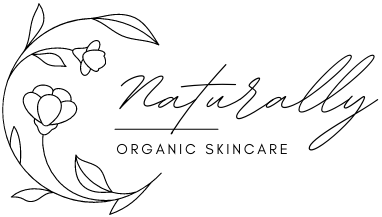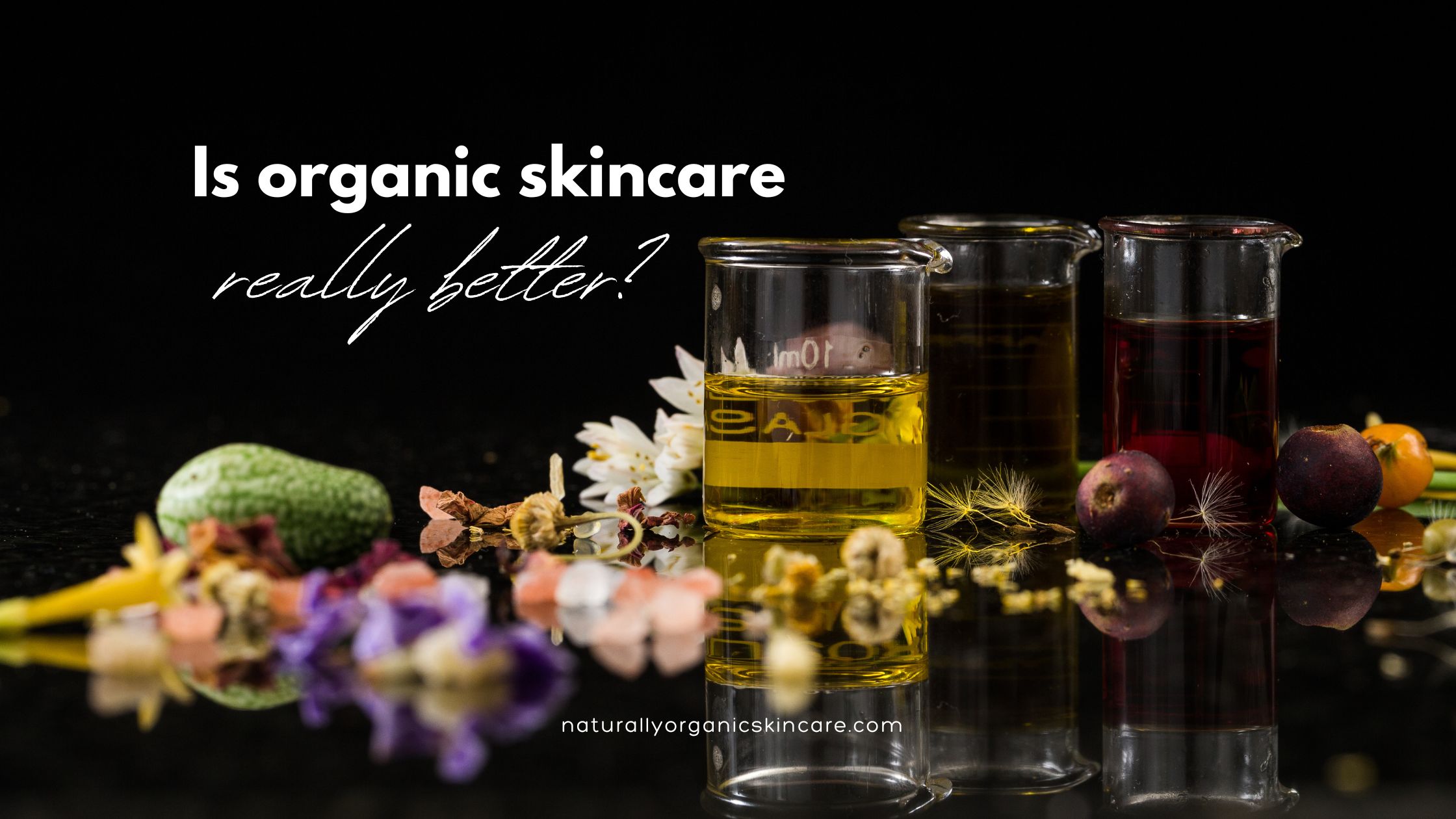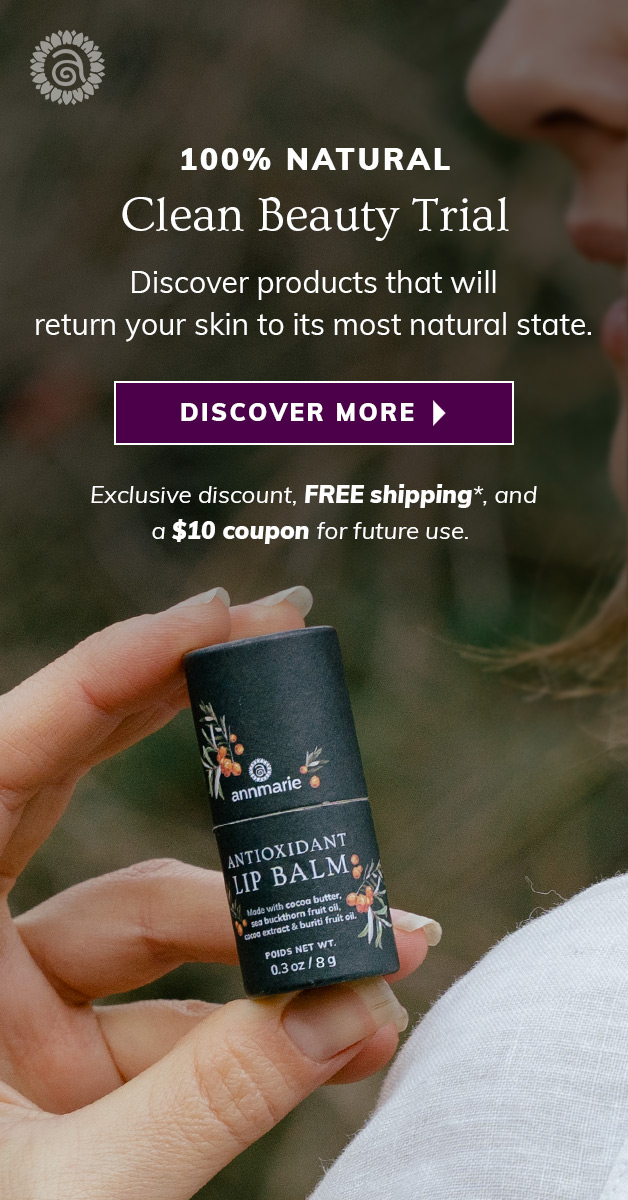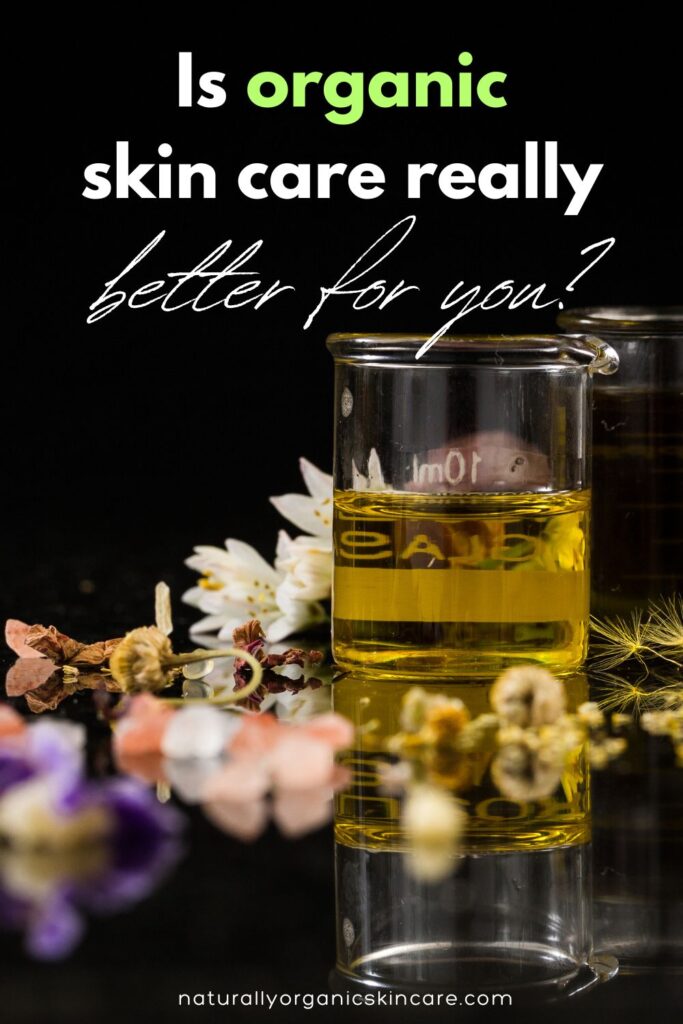Is organic skincare better? Great question – I’m so glad you asked. Why don’t you block the next half hour or so for my virtual soapbox session on the subject?
No, you say – no time for that? Of course not. Just kidding. We’re all busy. And I’m going to blaze through the why’s, how’s and whatcha-ma-call-it’s of natural and/or organic products in a blip.
Then, pip pip – on your way, and off to something else fun to do! But I promise you’ll have a decent understanding of what natural and organic skincare entails, and a better idea of whether it is for you.
In recent years, the organic skincare movement has exploded in popularity, with consumers increasingly looking for products free from synthetic chemicals, artificial fragrances, and potentially harmful additives. But is organic skincare really better, or is it just another trend? In this guide, we’ll dive deep into what organic skincare truly offers, its benefits and limitations, and how to decide if it’s the best choice for you.
What is Organic Skincare?
Organic skincare is crafted from ingredients grown and processed without synthetic pesticides, herbicides, or genetically modified organisms (GMOs). Certified organic skincare products typically adhere to strict standards, ensuring that at least 95% of their ingredients are organically grown. This approach prioritizes natural, minimally processed ingredients that work with, rather than against, the skin.
Key Benefits of Organic Skincare:
- Fewer Harsh Chemicals: Organic products are free from synthetic preservatives, parabens, and other harsh chemicals often linked to skin irritation.
- Higher Antioxidant Content: Studies show that organic crops have higher levels of antioxidants compared to conventionally grown ones, which translates into more skin-protective antioxidants in organic skincare products. [Link to study extract]
- Eco-Friendly and Sustainable: Organic farming reduces environmental pollution and is generally more sustainable, minimizing impact on soil and water quality.
The Science: Why Organic Ingredients Can Benefit the Skin
One of the most compelling reasons to choose organic skincare is the abundance of nutrients. Organic plant oils and extracts often contain higher levels of essential vitamins, antioxidants, and fatty acids that nourish the skin deeply. For example, organic rosehip oil is rich in vitamin C and essential fatty acids, both of which support collagen production and skin healing.
Furthermore, organic products lack synthetic fillers or artificial fragrances, both of which can cause sensitivity and irritation. For people with sensitive skin, this can make a significant difference. In fact, studies indicate that certain synthetic preservatives, such as parabens, can disrupt the skin’s natural microbiome, leading to irritation and even accelerated aging in the long run. [Link to study extract]
Benefits of Organic Skincare Over Conventional Skincare
1. Skin-Soothing Properties
Many organic products contain botanical extracts like aloe vera, calendula, and chamomile, known for their soothing properties. These natural extracts help reduce inflammation and redness, making organic skincare an appealing choice for sensitive skin.
2. Reduced Exposure to Toxins
Organic skincare avoids synthetic pesticides, herbicides, and GMOs, which can leave traces in conventional skincare products. By choosing organic, you reduce your exposure to these potential toxins, which some studies suggest may have long-term health implications.
3. Bioactive Compounds for Effective Results
Organic products are more likely to contain bioactive compounds—natural chemicals in plants that have been shown to be effective in skincare. For example, pomegranate oil is high in punicic acid, a rare fatty acid that can soothe inflammation and support collagen production, making it highly beneficial for mature skin.
4. Rich in Natural Antioxidants
Organic ingredients often contain higher concentrations of antioxidants, which are essential for protecting the skin from environmental stressors and free radicals. These antioxidants, like vitamin E, C, and beta-carotene, help delay signs of aging by fighting oxidative stress on the skin.
Fun Fact: Studies show that organic tomatoes have 79% more quercetin (a powerful antioxidant) than conventionally grown tomatoes, indicating that organic farming practices could enhance antioxidant levels across various plants. [Link to study extract]
Common Myths About Organic Skincare
As with any skincare trend, organic skincare has its share of myths. Let’s debunk a few:
Myth #1: Organic Skincare is Always Better for Sensitive Skin
While organic skincare often contains fewer irritants, some organic ingredients—such as essential oils—can cause sensitivity in certain individuals. Always check labels and perform a patch test to ensure a product is compatible with your skin.
Myth #2: Organic Means 100% Natural and Pure
Organic products can still contain certain approved preservatives and stabilizers to maintain product integrity. Look for certification from reputable bodies like USDA Organic or COSMOS to ensure the organic claims are verified.
Myth #3: Organic Skincare is Less Effective
Some believe organic skincare lacks the power of synthetic actives, but many organic ingredients are highly effective. For example, organic rosehip oil and hyaluronic acid from plants provide vitamins and hydration that deliver long-lasting skin benefits without synthetic additives.
Key Ingredients in Organic Skincare That Make a Difference
Choosing organic skincare is about selecting products that contain powerful, effective ingredients with proven benefits. Here are some key organic ingredients and why they stand out:
1. Rosehip Oil
Rich in vitamins A and C, organic rosehip oil is a top choice for fading dark spots, boosting collagen, and giving skin a natural glow. Its fatty acids also make it a great option for mature or dry skin.
2. Aloe Vera
Known for its cooling and soothing properties, organic aloe vera is excellent for calming irritated or inflamed skin. It provides a layer of hydration without clogging pores, making it ideal for sensitive skin types.
3. Green Tea Extract
This powerhouse antioxidant helps fight free radicals, reduce inflammation, and protect skin against environmental damage. Organic green tea retains higher polyphenol content, enhancing its skin-protective benefits.
4. Calendula
Calendula is a gentle yet potent flower extract known for its healing properties. Organic calendula is often used in creams and serums designed to calm redness and support skin barrier repair.
5. Shea Butter
Organic shea butter provides intense moisture without clogging pores. It’s packed with vitamins A and E, which are crucial for skin health and protecting against dryness.
How to Choose the Right Organic Skincare Products
To choose high-quality organic skincare, look for certifications like USDA Organic or COSMOS, as these organizations enforce strict standards on sourcing, processing, and labeling. Additionally, read ingredient lists carefully—organic doesn’t always mean allergy-free, so make sure to check for potential irritants like essential oils if your skin is sensitive.
Pro Tip: Start with a few organic products to see how they work with your skin. A gentle cleanser, a hydrating serum, and a moisturizer with organic ingredients can give you a solid start and reveal how organic skincare aligns with your needs.
Final Verdict: Is Organic Skincare Better?
Whether organic skincare is “better” depends on your skin’s needs, lifestyle, and personal preferences. Here’s a quick summary to help decide if it’s right for you:
- If you have sensitive skin or want to avoid harsh chemicals, organic skincare can provide gentle, effective solutions with fewer irritants.
- If eco-friendly, cruelty-free products are important to you, organic skincare often aligns with these values and can help support sustainable farming and environmental responsibility.
- If you’re looking for antioxidant-rich products, organic skincare can offer potent, naturally-derived ingredients that work well with the skin.
While organic skincare can be an excellent choice, not all products are created equal. Choosing organic products from reputable brands with science-backed formulations can help you enjoy the unique benefits of organic skincare.





